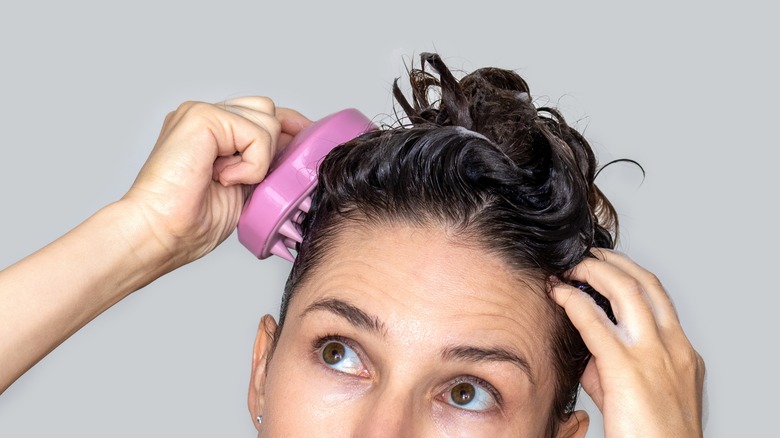How Often Should You Exfoliate Your Scalp? Here's Our Advice
Exfoliation is not a word that's reserved only for your facial or bodily skin anymore. Your scalp deserves some TLC too.
Just like the skin on the rest of your body, your scalp goes through skin cell turnover and buildup of dirt and debris frequently. In fact, having hair strands growing out of your scalp makes things that much more complicated, as dead skin cells and styling products like conditioners, hair mousse, and dry shampoo can get stuck in your scalp and the roots of your locks. Which means, there's all the more reason to exfoliate your scalp. As certified trichologist Gretchen Friese explained to Real Simple, "Scalp exfoliation helps to create a healthy environment for the hair to grow by cleaning out anything that might be clogging or blocking the follicles." Think of your scalp as the soil in which your hair grows. Healthy and beautiful hair is not possible without a healthy scalp.
But just like with any good thing, frequency matters. If you're wondering what the deal is with scalp care and exfoliation, there can be conflicting advice out there. Here's how often you actually should be exfoliating when it comes to your scalp.
Less is more with scalp exfoliation
Unless you have a particularly oily scalp that's been through a lot of hair products, once in two weeks or once every seven to 10 times you shampoo-wash your tresses is a good rule to go by.
Board-certified dermatologist Ife Rodney told MBGLifestyle, "The most important tip is that 'less is more.' You want to exfoliate just enough to increase cell turnover and reveal fresh new skin." There are signs that might alert you as to when your scalp might benefit from such extra attention. If your scalp feels heavy with gunk and buildup and is particularly itchy and flaky, this might mean that an exfoliation is in order. In fact, according to trained trichologist and hairstylist Shab Reslan (via MBGLifestyle), dirt and oil buildup that suffocates your hair follicles can actually cause pain sometimes. "So when you're moving your hair around, it's the inflammation that you are feeling," he explained.
It's important to keep in mind, however, that scalp exfoliation is not recommended and/or suitable for everyone. Those with underlying skin conditions like psoriasis, acne or eczema shouldn't attempt to exfoliate unless otherwise recommended by a doctor, as exfoliation could potentially exacerbate such problems. But now that you know how often you should exfoliate, what kind of products should you use?
Scalp exfoliants come in two forms and functions
There are two main types of scalp exfoliants — physical and chemical. Physical exfoliants can be store-bought or even made at home and generally contain a granular substance that is used to physically remove dead skin cells and product buildup from your scalp. Chemical exfoliants contain active ingredients like salicylic acid or glycolic acid that help dissolve dirt by loosening the bonds between the cells. Tea-tree oil is another great product with anti-inflammatory properties that is used for exfoliation. Some haircare enthusiasts also swear by products like exfoliating brushes that get the job done just as well. All you need to do is gently brush your scalp in a zigzag fashion before jumping in the shower.
The important thing is to be gentle, whatever method you choose. You want to treat the skin on your scalp just as you would your face. Should you use a scalp scrub, use your fingers and gently work the substance onto your scalp for a few minutes before rinsing it out. Most chemical exfoliants will have to sit on your scalp for about 10-15 minutes for the acids to work, but you should use the product as directed. You can then go ahead and wash your hair as you normally would with shampoo and conditioner. But even if the cleansing nature of it doesn't appeal to you, the decision to exfoliate your scalp is a great way to spend time doing some self-care every few weeks. Healthy hair can just be a happy bonus.

